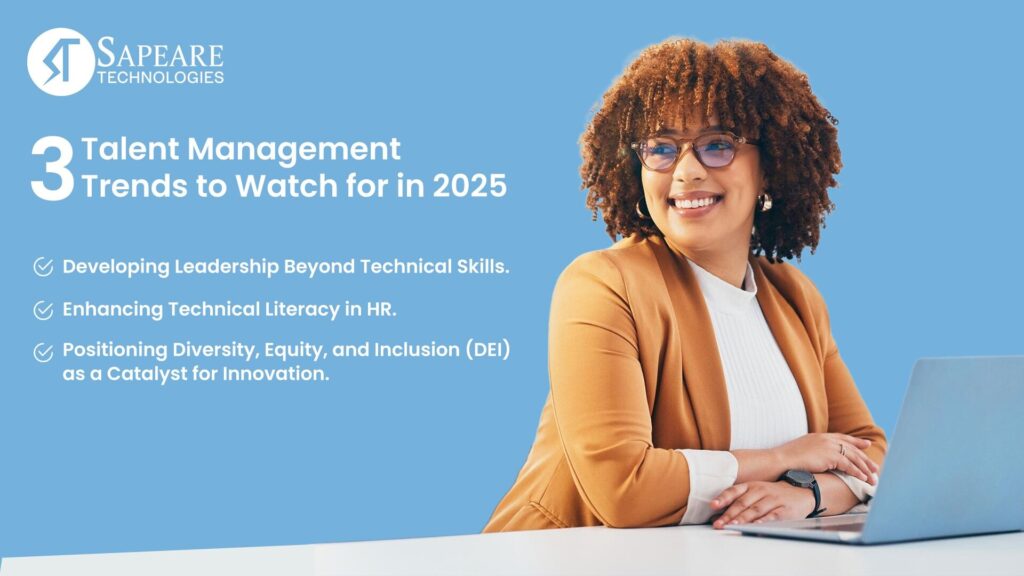In an era defined by rapid technological advancements, shifting market dynamics, and evolving workforce expectations, effective talent management has become more crucial than ever. As organizations prepare for 2025 and beyond, they must anticipate and adapt to trends reshaping how talent is sourced, nurtured, and retained. Sapeare Technologies stands at the forefront of helping businesses develop innovative strategies to address these challenges, leveraging industry insights and advanced solutions to drive sustainable growth.
According to the World Economic Forum, 23% of jobs globally will undergo transformation by 2027, leading to the displacement of 83 million roles while creating 69 million new ones. These statistics underscore the urgency for businesses to rethink their talent management strategies to ensure resilience in an increasingly competitive landscape. This blog explores key talent management trends, opportunities, challenges, and actionable insights to guide organizations toward a more agile future.

The Significance of Talent Management in 2025
Talent management encompasses the end-to-end lifecycle of recruiting, training, developing, and retaining employees. When strategically executed, it aligns workforce capabilities with organizational goals, driving engagement, innovation, and performance. Yet, many organizations fall short in leveraging the full potential of their workforce due to a lack of actionable data.
A Gartner report highlights that only 8% of organizations have comprehensive data on their workforce’s current skills and their alignment with business priorities. This gap hinders the ability to forecast workforce needs and design impactful learning initiatives. Forward-thinking companies that adopt data-driven talent strategies stand to gain a competitive edge by building resilient teams equipped to navigate tomorrow’s challenges.
How Learning and Development (L&D) Accelerates Organizational Growth
Learning and development (L&D) initiatives are pivotal for fostering a culture of growth and adaptability. When aligned with corporate objectives, these programs not only prepare employees for emerging demands but also create meaningful career pathways. Here’s how L&D fuels growth:
- Boosting Performance: Training employees in role-specific and soft skills enhances productivity and operational efficiency.
- Improving Retention: Employees with access to upskilling opportunities are more likely to stay committed to their organizations. According to LinkedIn’s 2023 Workplace Learning Report, 94% of employees would stay at a company longer if it invested in their learning.
- Fostering Innovation: L&D programs encourage continuous learning, enabling teams to explore creative solutions and adapt to market disruptions effectively.
Organizations that invest in targeted L&D programs can align employee performance with strategic goals, whether it’s driving revenue growth, enhancing customer experiences, or accelerating innovation.
Three Talent Management Trends to Watch for in 2025
As we approach 2025, several emerging trends will shape the future of talent management. These trends emphasize the need for organizations to rethink traditional strategies and focus on long-term workforce development.
1. Developing Leadership Beyond Technical Skills
While high performers often excel in their roles, promoting them to leadership positions without adequate training in soft skills can undermine team cohesion and performance. Effective leadership demands a mix of emotional intelligence, communication, and conflict resolution skills. Organizations must design programs to bridge this gap and cultivate leaders who inspire teams, foster collaboration, and drive collective success.
2. Enhancing Technical Literacy in HR
With the growing reliance on advanced HR technologies, professionals must go beyond traditional administrative roles and develop technical expertise. This includes understanding data analytics, automation, and AI-driven insights to make informed decisions. According to Deloitte, 74% of HR leaders believe HR technology is critical to organizational success, yet only 21% feel confident in their teams’ tech proficiency. Upskilling HR professionals in technical literacy will empower organizations to harness the full potential of integrated platforms and drive data-informed strategies.
3. Positioning Diversity, Equity, and Inclusion (DEI) as a Catalyst for Innovation
Organizations must transition from viewing DEI as a compliance measure to leveraging it as a business growth strategy. By emphasizing “diversity of experience,” businesses can enhance problem-solving capabilities, increase adaptability, and deliver smarter solutions. Research by McKinsey & Company reveals that companies in the top quartile for diversity are 36% more likely to outperform their peers in profitability, highlighting the tangible benefits of inclusive workplaces.
Learning from Past Trends to Shape the Future
Reflecting on previous trends in talent management provides valuable insights for navigating the road ahead. Over the past decade, organizations have prioritized initiatives like hybrid team training, skills-based hiring, and digital transformation. These strategies are no longer forward-thinking but foundational.
However, the focus for 2025 must shift toward integrating these practices into broader workforce strategies. For instance:
- Skills-based Hiring: Moving beyond credentials to emphasize core competencies and adaptability.
- Hybrid Work Models: Investing in tools and frameworks that support collaboration and productivity in remote and on-site teams.
- Digital Transformation: Adopting AI and automation to streamline processes and improve workforce efficiency.
By leveraging lessons from the past, organizations can better align with future demands and remain agile in an evolving talent landscape.
Conclusion
As the talent landscape continues to evolve, organizations must adopt forward-thinking approaches to attract, develop, and retain top talent. Strategic talent management isn’t just about addressing today’s needs—it’s about preparing for the workforce challenges of tomorrow. By focusing on leadership development, technical literacy, and inclusivity, businesses can create a resilient, high-performing workforce equipped for the future.
Sapeare Technologies partners with organizations to craft innovative and data-driven talent management solutions. Contact us today to learn how we can help your business stay ahead. Email us at [email protected] or call us at (404) 528-2618 for a consultation.


Comments are closed